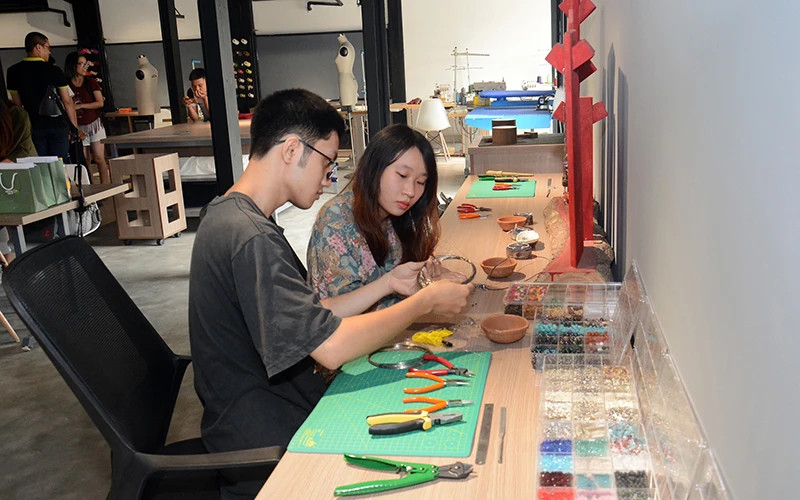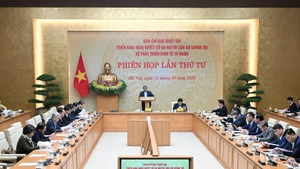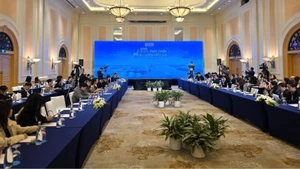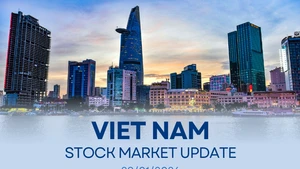The development of various capital sources and the establishment of a transparent and safe investment environment will maximise the ability of innovative startups to effectively access both domestic and foreign capital.
Increasing attractiveness to global investors
According to statistics from the Department of Market Development and Science and Technology Enterprises under the Ministry of Science and Technology, Vietnam currently has about 3,800 startups, including 11 valued at over 100 million USD and three valued at over 1 billion USD. The common sources of capital that innovative startups access include state support, investment from foreign investors and venture capital funds, investment from domestic investors and venture capital funds, funds established within corporations and enterprises, and investment through incubators and business accelerators, angel investors, and loans.
In 2018, Decree No. 38/2018/ND-CP was issued detailing investments for small and medium-sized innovative startups, thus creating a driving force for the creation and development of innovative startup funds in Vietnam. According to the BambuUP Innovation Connection Platform, there are currently about 210 venture capital funds operating and investing in innovative startups in Vietnam, including nearly 40 domestic funds. In fact, investors and venture capital funds play a key role in funding innovative startups.
According to the Vietnam Innovation and Tech Investment Report 2021 published by NIC, the total venture capital investment in Vietnamese innovative startups in 2021 reached 1.4 billion USD. According to the estimates of ThinkZone Ventures, about 90% of this capital came from foreign venture capital funds.
International consulting firm Bain & Company reported that Vietnam is leading Southeast Asia in the attraction of long-term investors. Investors predict that investments in Vietnam during the 2025-2030 period will increase by 83% compared to the current period.
However, experts noted that international investors face many difficulties when operating in Vietnam's innovative startup market. Foreign venture capital funds investing directly in Vietnamese startups are treated like regular foreign investors, encountering challenges in investment licensing, managing investments, divesting, repatriating profits, and dealing with tax issues.
Due to these challenges, many foreign investors prefer not to invest directly into Vietnamese innovative startups. Instead, they require startups to restructure themselves by establishing a parent company abroad, then they inject capital into this parent company to benefit from foreign incentives. This process incurs significant costs related to consulting, establishing, and maintaining the foreign entity, placing innovative startups at a disadvantage due to operating within an unfamiliar legal environment.
Regarding domestic venture capital, improvements are still needed to truly unlock domestic capital flows and investment potential for innovative startups. Based on its experience with investment in many Vietnamese innovative startups, ThinkZone Ventures' representative pointed out that existing regulations pose numerous obstacles, making it difficult to establish, manage, and operate funds. Therefore, it is essential to improve the business environment and harmonise regulations on innovative startup investments.
Highlighting the inadequacies of Decree No.38/2018/ND-CP, which serves as the legal basis for the establishment and development of innovative startup funds in Vietnam, Director of BK Fund Pham Tuan Hiep noted that the regulation limits the number of investors contributing capital to form funds. The relationship between fund management companies and investment funds is not clearly defined, leading to ambiguity regarding the entities participating in transactions. In addition, it does not anticipate scenarios where innovative startup funds register to invest abroad alongside startups, necessitating early divestment despite the startup's potential.
Policies on indirect investment and support from the state budget can motivate innovative startups and build investor confidence. However, the Ministry of Science and Technology acknowledges that existing policies still have many shortcomings, such as: preferential capital not reaching innovative startups; specialised legal documents not reflecting supportive measures (taxes, loan policies, etc.); and grassroots management units not understanding nor facilitating innovative startups.
Solutions to facilitate capital flow
According to Nguyen Huong Quynh, CEO of BambuUP, the investment trend in innovative startups will become more dynamic in the near future. However, it will focus on specific sectors and the criteria of venture capital funds will be more closely tied to financial indicators, even requiring innovative startups to have strong cash flow and profitability. As investment criteria become stricter, innovative startups will need to make significant efforts to attract investment capital.
In addition to the efforts from innovative startups to create effective business models and operations, Nguyen Huong Quynh emphasised the need for macro factors including continuing efforts to make Vietnam's startup ecosystem attractive to both domestic and international investors. This requires programmes to support startups through robust and genuine communication; favourable mechanisms for foreign funds to easily invest and divest in Vietnamese companies; and channels and solutions for investors to learn more about Vietnam's innovative startup ecosystem through accurate statistics, support policies from the government, and achieved results.
Currently, the ecosystem lacks the presence of corporations, whereas the investment strategies of domestic enterprises and corporations in startups are a solution to facilitate capital flow. Therefore, it is also essential to focus on unlocking capital sources through cooperation opportunities between domestic corporations and innovative startups.
The creation of new funding channels has been also discussed by many experts. One such channel is crowdfunding for startup groups with long research and product development periods. Pham Ngoc Huy, CEO of Lotte Ventures Vietnam, proposed that the deployment of a mechanism to encourage successful entrepreneurs to establish funds for innovative startups would significantly increase capital flow in the market. This model will be more effective than corporate funds because it is non-profit and aims to create long-term societal value.
Huy also stated that investors are the most crucial component in building a strong ecosystem. When there are many investors offering various types of support, innovative startups in Vietnam will be more motivated to start businesses, and foreign startups will also "jump" into Vietnam, creating a startup wave. To achieve this, it is essential to create an environment that attracts foreign investors to Vietnam. If investment continues to be injected at the parent companies established abroad, it will be challenging to build a capital market in Vietnam.
Bui Thanh Do, Co-founder and CEO of ThinkZone Ventures, affirmed that policies must ensure favourable conditions for investment fund activities and create a transparent, fair, and stable business environment, giving investment funds confidence when investing in innovative startups in Vietnam. Additionally, there should be preferential policies for funds such as tax reductions, financial support, preferential credit packages, and the establishment of special economic zones with infrastructure and service incentives. Some preferential policies for funds are stipulated in the Law on Supporting Small and Medium Enterprises and Resolution No. 98/2023/QH15, which mentions corporate income tax exemptions and reductions as well as tax exemptions when divesting, but these have not been implemented due to inconsistencies with related regulations. A positive sign is that the Capital Law and the draft Law on Corporate Income Tax mention some incentives for investors.
In response to the shortcomings in the field of innovative startups, the government has asked the Ministry of Science and Technology to draft a decree on state management of innovative startups and innovation. The Law on Science and Technology is also being amended and supplemented. However, many investors believe that to become an attractive destination for investors and to meet the opportunities of innovative startups it is necessary to establish experimental zones (sandboxes) for certain specific sectors and subjects while waiting for the completion of the legal framework.
















